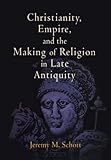Christianity, Empire, and the Making of Religion in Late Antiquity / Jeremy M. Schott.
Material type: TextSeries: Divinations: Rereading Late Ancient ReligionPublisher: Philadelphia : University of Pennsylvania Press, [2013]Copyright date: ©2008Description: 1 online resource (272 p.)Content type:
TextSeries: Divinations: Rereading Late Ancient ReligionPublisher: Philadelphia : University of Pennsylvania Press, [2013]Copyright date: ©2008Description: 1 online resource (272 p.)Content type: - 9780812240924
- 9780812203462
- 270.1
- online - DeGruyter
- Issued also in print.
| Item type | Current library | Call number | URL | Status | Notes | Barcode | |
|---|---|---|---|---|---|---|---|
 eBook
eBook
|
Biblioteca "Angelicum" Pont. Univ. S.Tommaso d'Aquino Nuvola online | online - DeGruyter (Browse shelf(Opens below)) | Online access | Not for loan (Accesso limitato) | Accesso per gli utenti autorizzati / Access for authorized users | (dgr)9780812203462 |
Browsing Biblioteca "Angelicum" Pont. Univ. S.Tommaso d'Aquino shelves, Shelving location: Nuvola online Close shelf browser (Hides shelf browser)

|

|

|

|

|

|

|
||
| online - DeGruyter Yigal Allon, Native Son : A Biography / | online - DeGruyter Used Books : Marking Readers in Renaissance England / | online - DeGruyter Beyond the Farm : National Ambitions in Rural New England / | online - DeGruyter Christianity, Empire, and the Making of Religion in Late Antiquity / | online - DeGruyter Smack : Heroin and the American City / | online - DeGruyter Protestant Empire : Religion and the Making of the British Atlantic World / | online - DeGruyter Culture and Belonging in Divided Societies : Contestation and Symbolic Landscapes / |
Frontmatter -- Contents -- Introduction. Identity Politics in the Later Roman Empire -- Chapter 1. Philosophers, Apologists, and Empire -- Chapter 2. Porphyry on Greeks, Christians, and Others -- Chapter 3. Vera Religio and Falsae Religiones: Lactantius's Divine Institutes -- Chapter 4. What Difference Does an Emperor Make? Apologetics and Imperial Ideology in Constantine's Oration to the Saints and Imperial Letters -- Chapter 5 From Hebrew Wisdom to Christian Hegemony: Eusebius of Caesarea's Apologetics and Panegyrics -- Epilogue Empire's Palimpsest -- Appendix. Porphyry's Polemics and the Great Persecution -- Abbreviations -- Notes -- Bibliography -- Index -- Acknowledgments
restricted access online access with authorization star
http://purl.org/coar/access_right/c_16ec
In Christianity, Empire, and the Making of Religion in Late Antiquity, Jeremy M. Schott examines the ways in which conflicts between Christian and pagan intellectuals over religious, ethnic, and cultural identity contributed to the transformation of Roman imperial rhetoric and ideology in the early fourth century C.E. During this turbulent period, which began with Diocletian's persecution of the Christians and ended with Constantine's assumption of sole rule and the consolidation of a new Christian empire, Christian apologists and anti-Christian polemicists launched a number of literary salvos in a battle for the minds and souls of the empire.Schott focuses on the works of the Platonist philosopher and anti- Christian polemicist Porphyry of Tyre and his Christian respondents: the Latin rhetorician Lactantius, Eusebius, bishop of Caesarea, and the emperor Constantine. Previous scholarship has tended to narrate the Christianization of the empire in terms of a new religion's penetration and conquest of classical culture and society. The present work, in contrast, seeks to suspend the static, essentializing conceptualizations of religious identity that lie behind many studies of social and political change in late antiquity in order to investigate the processes through which Christian and pagan identities were constructed. Drawing on the insights of postcolonial discourse analysis, Schott argues that the production of Christian identity and, in turn, the construction of a Christian imperial discourse were intimately and inseparably linked to the broader politics of Roman imperialism.
Issued also in print.
Mode of access: Internet via World Wide Web.
In English.
Description based on online resource; title from PDF title page (publisher's Web site, viewed 24. Apr 2022)


